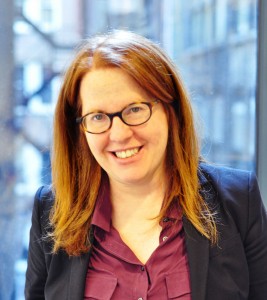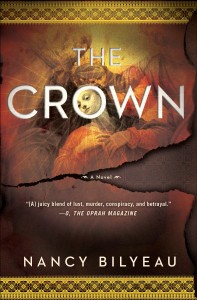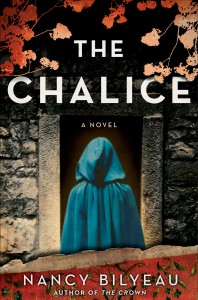 I’ve been awaiting this interview, and I am delighted to present author Nancy Bilyeau, writer of the historical thrillers: The Crown, The Chalice, along with a third novel in- the-works The Covenat. The series follows the life of an aristocratic young Dominican nun, Joanna Stafford, and her quest to save a legendary crown and to survive the tumultuous Tudor times of King Henry VIII in England. These are engaging and fast-paced reads.
I’ve been awaiting this interview, and I am delighted to present author Nancy Bilyeau, writer of the historical thrillers: The Crown, The Chalice, along with a third novel in- the-works The Covenat. The series follows the life of an aristocratic young Dominican nun, Joanna Stafford, and her quest to save a legendary crown and to survive the tumultuous Tudor times of King Henry VIII in England. These are engaging and fast-paced reads.
And The Chalice is currently on e-book promotion for the month of June, don’t miss this amazing deal: $2.99!
Q: Where did your inspiration for The Crown and The Chalice come from?
My passion for Tudor history. I’ve been reading about the 16th century since I was 11 years old. When I decided to take the plunge and try to write a novel, I thought it made the most sense to set my story in the Tudor era. I love mysteries and thrillers, so I fused the two genres: historical fiction and thriller. It was important to me to write a female protagonist. Who would be at the center of my thriller? I didn’t want to write about a royal or lady of the court; I was eager to create my own fictional character and for her to be someone original to readers familiar with these types of books. So I came up with the idea of writing about the life of a Dominican novice at the point of dissolution of the Catholic Church. I thought it would yield intense drama, that she is coping with this cataclysmic change at the same time that she is thrust into .I thought it would yield intense drama, that she is coping with this cataclysmic change at the same time that she is thrust into a mystery with a dangerous mission.
Q: While writing The Crown and The Chalice do you feel like you gained any new spiritual insights from researching and creating these books, and if so, how?
That’s an interesting question. I did not set out to write these books with a religious agenda. For one thing, I don’t have an agenda. I was brought up by agnostic parents and with little sense of a spiritual life. However, it’s more complicated than that. My mother’s family is Irish American; she attended Catholic schools but left the church in her twenties. However, my grandparents babysat me when we lived in Chicago, and when I was an infant, they had me secretly baptized. My grandmother told my mother about it when I was 19. My grandfather had just died, and she was ill—she wanted us to know. Ever since then, I’ve been intrigued by the Catholic Church. When I set out to write The Crown, I had never met a nun. I plunged into years of research, and the more I learned about the women who entered religious life in the Plantagenet and early Tudor era, the more they fascinated me. I met a modern-day Dominican sister; she read The Chalice in manuscript form and gave me some corrections. She’s a very nice, smart person—and funny—and knowing her is wonderful. I have a great deal of respect for nuns, past and present. And I feel protective of them.
Q: Could you tell us more about your protagonist nun Joanna’s Dominican Order during mid-16th century England and the mysticism of the seers you write about in your new novel The Chalice — are there interesting tidbits you know now but couldn’t include in the novel?
The Dominican priory in Dartford was a very interesting place. Edward III put time and thought and money into establishing it in the 14th century. I should back up and add that his father, Edward II, made the first initiatives to creating a convent for the women of the Dominican order. He set up endowments and obtained the papal license but was deposed before the sisters could travel from France to England. Perhaps Edward III–who in turn deposed his mother Queen Isabella and her lover and took power when he reached the age of 17 –felt some link to his father and that is what motivated him? I am speculating. Certainly there were other matters of importance in the kingdom, such as invading France and surviving the Bubonic Plague!
But the priory was established in the 1350s. Edward III had a goal of reaching a convent of 40 nuns, but it never quite reached that number. For the next 180 years it attracted women from the gentry and the aristocracy and even the royal family–the youngest child of Edward IV, Princess Bridget, took vows. Dartford earned a reputation for “strict discipline and plain living.” Much of a nun’s day and night was taken up by prayer and service to God. There was a small library there with beautiful illuminated manuscripts. In the larger community of Dartford, the priory played an important role: the sisters taught local girls to read, they gave alms to the poor, and they sponsored an almshouse for those who had no other place to live.
That all came to an end in 1538, when the priory was “surrendered” to Henry VIII and demolished. Everyone was ejected. It was a painful and confusing time. The following year, The Act of Six Articles became law, which forbade anyone who had ever taken a vow of chastity from marrying. Nuns could no longer carry out their vocations, but they couldn’t get married and start families either. There was no place for them in society.
Dominican mysticism was so interesting in this period. I wish I could have found a way to talk about Savonarola in my books. The Dominican friar Girolamo Savonarola preached about his prophetic visions to growing crowds in late 15th century Florence—that the corruption of society would be wiped away by the coming of a scourge. When the French king invaded Italy, this was widely seen as fulfillment of Savonarola’s prophecy.
Q: What challenges, if any, did you encounter while writing these books with spiritual foundations?
I was determined to create characters whose spiritual values were true to the 16th century. I did worry that readers would not be able to relate to Joanna Stafford, especially since I write the books in this series in the first person and you have no choice but to get into Joanna’s head. Not every author goes this route. I have read other novels set in medieval England and the 16th century with characters who are cynical about religion, even agnostic. That is common now, of course, but it really wasn’t a mindset that would have been possible then. Read the letters of the time, or books by the religious such as “The Dialogue of St. Catherine of Siena.”
I am happy to say that no one has emailed or otherwise contacted me to say that the books are “too religious.” It’s the opposite, I think readers want to experience a different way of looking at life than we have now.
Q: Author Stephanie Cowell recently wrote a blog post for English Historic Fiction Authors blog called “Nuns, monks, priests and believers: writing about spiritual matters in English historical fiction,” she wrote: “It is difficult to write about spiritual matters. They are the most intimate of our feelings and more difficult to express in words than physics…”. What are your thoughts about writing about spiritual matters?
I try to weave it into my characters’ daily lives: going to Mass, making Confession, praying. It frames their worldview. I don’t stop the story for my protagonist to overtly discuss how she feels about God.
Q: I recently read an interview with you where you mentioned that you wrote The Chalice “workshopping it.” Would you please share with us the process of writing a novel, “workshopping it” to completion. I was very intrigued when I read this!
I share my work with small groups of other writers, either reading it out loud or sending chapters back and forth online. To me, this is essential. I sometimes feel as if something is coming across a certain way in my story and the reality is—not quite. I need that sounding board to know what is unclear or not paced right or lacking emotion. I revise a great deal, maybe that’s part of being a magazine writer or editor—I like feedback. I can’t imagine writing an entire book in a vacuum and sending it to my agent or book editor.
Q: Do you have any particular workshops you’d like to recommend to writers?
I’ve taken classes at Gotham Writer’s Workshop, there were several great online fiction courses (an advanced one taught by novelist Russell Rowland) and a mystery-writing special class taught by Greg Fallis.
Q: Please tell us about the success process of the Amazon Daily $1.99 special, how did it all go down? Soaring THE CROWN to 1 # status in all literary categories!
That was exciting. In the United States my books are published by Touchstone, an imprint of Simon & Schuster. Amazon decided to make The Crown the Kindle Daily Deal for one day, which means not only that the e-book price is lowered to $1.99 but there is plenty of promotion. I will never forget the experience of watching the number go lower and lower and lower, until it reached No. 1 in America. Not all Kindle Daily Deals make it to No 1, so I am really honored and grateful. To be honest, it overwhelmed me, and the next day I had something of a headache and found it hard to get out of bed. My children were outraged.
The Chalice is part of a different promotion for the month of June: on Amazon in the United States, the e-book costs $2.99. I am happy to be able to deliver this savings.
Thank you Nancy for this interview and looking forward to your next release of the series!
To Buy The Crown and The Chalice click below!


